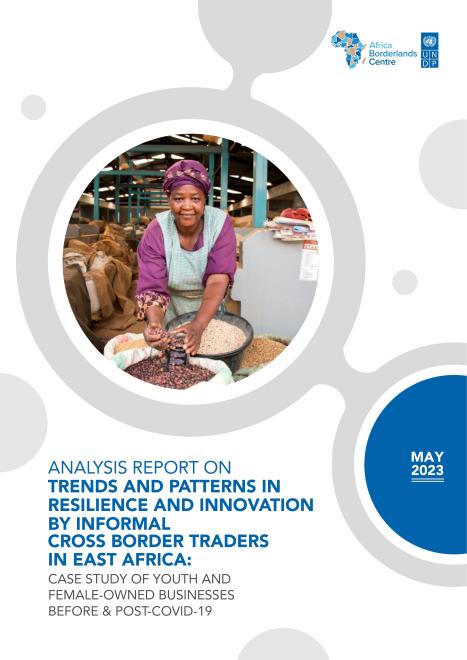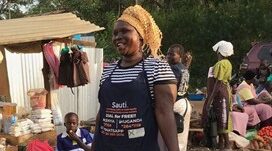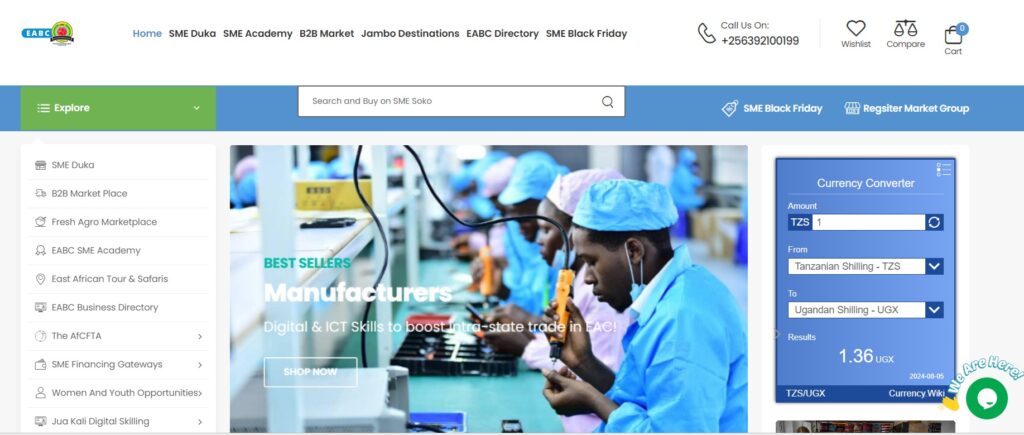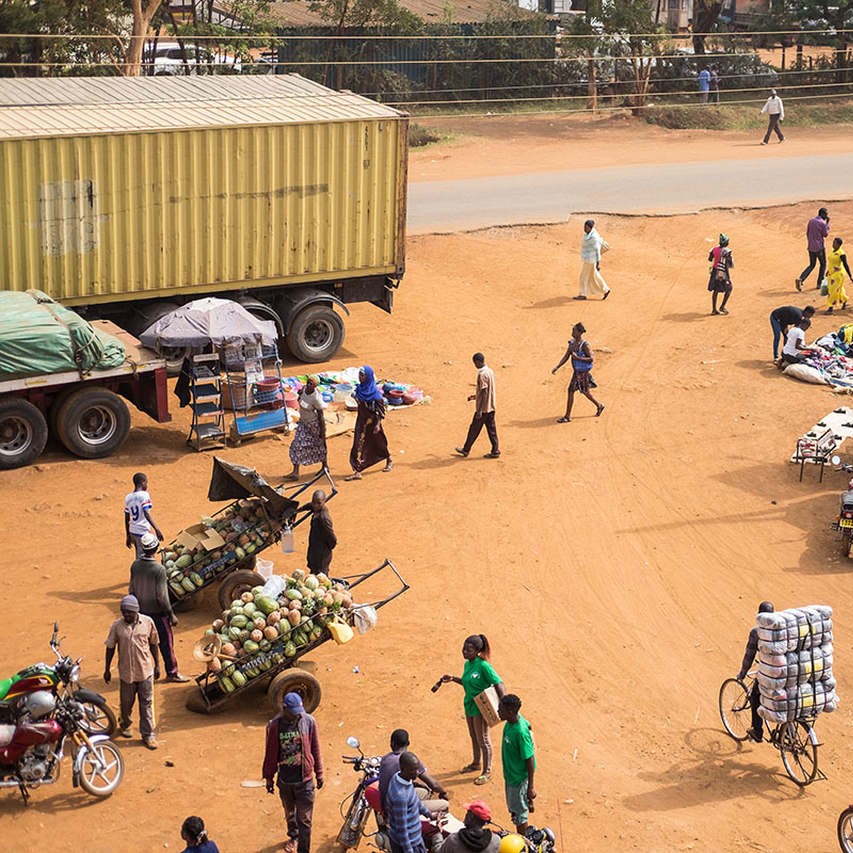
Creating Greater Market Inclusion for East Africa's MSMEs
Informal cross-border trade is a major feature of East African economies: it creates jobs, contributes to food and energy security, and alleviates poverty. Our specializations catalyze the link between trade and economic development:
Reducing Gendered Barriers to Participation in Trade
Empowering women in trade creates inclusive, equitable economic opportunities for all and promotes a thriving, more competitive marketplace.
Leveraging Digitalization and e-Commerce
E-commerce integration elevates trade, bridging markets and catalyzing economic development.
Reducing Trade and Market Information Barriers
Meaningfully accessible trade information levels the playing field for MSMEs, encouraging diverse market participation and more competition.
Strengthening Regional Support Networks
Regional business and trade associations empower traders, ensuring mutual support and enhancing access to cross-border market opportunities.
Improving Access to Cross-border Markets
Accessible cross-border markets catalyze economic development, encouraging diversified trade opportunities.
Enhancing Transparency and Accountability
Accountability ensures fair trade practices, establishing a safer and more profitable business environment for all MSMEs.
Promoting equitable, profitable, and safer trade for East Africa's MSMEs
Our experience with inclusive needs assessments, human-centred solution design, and stakeholder mapping across East Africa makes us experts in overcoming the traditional challenges that prevent sustainable and effective trade facilitation.
Problems we target, which prevent effective regional trade facilitation
Problem Statement
Comparatively low education and few learning experiences challenge women entrepreneurs’ perceived benefits to adopting ICTs. When surveyed, three-quarters of women traders had achieved at most a secondary school education (27% had primary only, and 10% had no formal education). Women entrepreneurs typically have poor access to ICT-focused learning experiences and few women can afford the time and lost profits to attend training opportunities during work hours. Further, domestic commitments prevent women from attending workshops in the early morning or evening.
The result is that, those with the technological capacity, but lacking the digital literacy, struggle to participate in e-commerce solutions – especially those that require navigating online browsers or smartphone apps.
Problem Statement
For micro and small-scale women-led businesses, few have access to internet-enabled computers or smartphones. Sauti surveys of approximately 700 women entrepreneurs in Kenya indicate that 33% of women owned a smartphone with internet access, compared to 78% of men.
While smartphone ubiquity is increasing throughout Kenya at an impressive rate, Sauti’s interviews with target beneficiaries suggest that women face significant domestic burden constraints and would, for instance, prefer to invest profits in paying for their children’s school fees rather than purchase new technology for their businesses.
Problem Statement
Despite the prevalence of women in the workforce, many positions of power in the regulatory environment are male dominated. These include border officials, trade brokers, money changers and law enforcement. Socially disadvantaged by gender norms, their economic capacity, and without alternative sources of information, women entrepreneurs are often forced to rely on options offered by their more empowered male counterparts in the domestic economy. Women therefore may be unaware of their legal rights, market opportunities and financial risks.
With poor access to reliable information, this environment significantly increases their risks of receiving deceptive and costly misinformation, and their vulnerability to corruption and sexual exploitation.
Problem Statement
Further complicating women’s effective participation in Kenya’s economy is women’s gendered experiences operating their businesses. Women traders typically buy and sell different goods in smaller volumes, and they have different business priorities and business experiences relative to male-operated enterprises. As such, the information sources that are available do not often conform to the needs of women business owners. For example, Kenya’s online one-stop KenTrade information portal is principally oriented towards international bulk export trade with Europe, rather than small-scale trade with geographic neighbors, which are the primary markets for women entrepreneurs.
Where women can overcome the socio-cultural and technological barriers to accessing official information, relevant information is often poorly available to suit their needs.
Problem Statement
Information resources in East Africa are typically oriented towards bigger-scale agricultural operations which are often male-dominated and have little relevance to women or MSMEs in the sector. While the sector has welcomed digitally-focused solutions such as online trade and agricultural information portals or smartphone apps, the gendered digital divide between those with access to the internet or smartphones, limits the benefits of technology-enabled interventions to women. While male traders face challenges of their own, they are often equipped with greater access to trade-related information, training, and know-how. As a result:
- MSMEs are often unfamiliar with the rights and obligations conferred to them by the trading regulatory environment often and consequently do not benefit from the protections and tariff reductions that promote small-scale traders in the region;
- MSMEs are more likely to commit inadvertent procedural violations, which can carry serious repercussions in the form of fines and arrests;
- MSMEs have few sources to compare retail prices for goods at each market before departure, resulting in CBTs discovering sub-optimal prices upon arrival at destination markets;
- MSMEs have few methods to independently verify foreign currency exchange rates, which money-changers capitalize on by exaggerating minor currency fluctuations.
Advancing East Africa's regional trade initiatives with proven, data-driven, inclusive solution designs
Leveraging our deep-rooted expertise in East Africa's dynamic trade ecosystem, we provide local services that enable our partners to supercharge their impact.
Capacity-building Support to East Africa’s Cross-Border Trade Associations
- Facilitation of collaboration and information-sharing among members.
- Training programs to enhance the effectiveness of East Africa’s cross-border trade associations.
- Digital tools to promote reach and sustainability for East Africa’s professional associations.
Trade Policy Assessment
- Assessments for opportunities and gaps in continental and regional trade-related policies and frameworks.
- Evidence-based recommendations for trade policy enhancement, reform, and implementation.
Non-tariff Barrier Identification and Solutions
- Informal trade NTB identification and cost analyses
- Crowd-sourced transparency, anti-corruption, and NTB reporting platforms
Trade Partner and Network Mapping
- Map and profile continental and regional-level stakeholders, including business associations, councils, cross-border trade associations, women, and youth groups.
- Provide evidence-backed insights to enhance program implementation, localization, and engagement.
Digitalization and ICT Solutions
- Capacity building workshops to improve access to current digital infrastructures.
- Development and implementation of e-commerce and digital trade platforms.
- Reach and sustainability strategies for improving ICT-led trade solutions .
Trade Formalization and Compliance Support for AFCFTA, EAC, and STR
- Identify barriers to formalization and opportunities to promote official trade compliance.
- Local trade policy training and capacity building to take advantage of the African Continental Free Trade Area
- Support to professional associations with compliance within the East African Community (EAC) and Single Customs Territory (STR).



